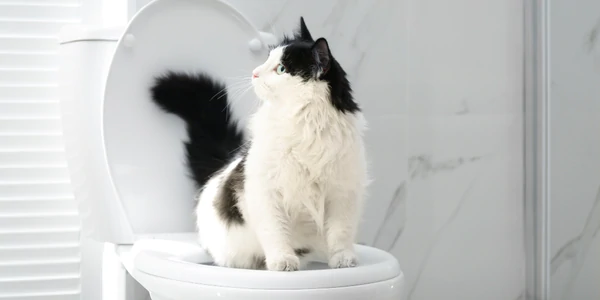Urinary Disease
So, in November, when the world is being asked to raise awareness of men’s health issues, there is a condition that is also more common at this time of year in cats; that affects almost exclusively males, a condition called urethral obstruction or a urethral blockage. Unfortunately, this condition is very serious and left untreated can be fatal to our feline friends, so it’s really important to know the signs to look out for.
Where is the cats urethra?
The urethra is a duct (tube) that carries urine out of the body from the bladder. In a Queen (female cat) this tube is pretty short and relatively wide but, in a Tom, (male cat) it is much longer and narrower which makes it much more prone to blockages. The tube has a delicate lining on the inside with a muscular layer in the middle that contracts in waves squeezing urine along its length to be voided out of the body, all of this is then protected by an outer covering.
What cause a urethral blockage?
A urethral obstruction (or ‘blocked bladder’) is normally secondary to a problem in the bladder, cystitis. Cystitis is the inflammation of the bladder lining and is a large topic which we will fully cover in a future article, but the basics are that it can be caused by bacterial infection, crystal formation in the urine, or more frequently due to stress.
The mechanism for stress induced cystitis in cats is not fully understood but there is a reduction in the protective mucus in the bladder which causes the bladder wall to inflame. Stress cystitis can affect both male and female cats, however male neutered overweight cats are the most prone to developing the condition.
What then can cause an obstruction fall largely into three categories:
Urinary Stones or calculi – formed by lots of crystals sticking together to create a firm, solid stone called a urolith. Uroliths are originally formed in the bladder but can be displaced when the animal urinates and depending on the size can then get lodged on route in the urethra.
A urethral plug – Excessive debris and mucus from the bladder often secondary to inflammation accumulates in the bladder and can also cause a problem when it is voided in the urine stream.

What are the signs of a cat with a urethral obstruction?
If a cat becomes ‘blocked’ then the signs are normally very obvious and classic for a diagnosis:
Repeated attempts to pass urine which are unproductive – sometimes this can be mistaken for constipation
Crying or distress with straining to urinate
Behavioural changes and signs of agitation or being grumpy
Lack of appetite
If a cat has been suffering from cystitis prior to an obstruction then there may already have been signs noticed in the preceding days such as using a litter tray more frequently, urinating in strange places, discomfort when passing urine and in some cases discoloured urine or blood present.
So if they display signs like this it is essential to establish whether they are passing urine every time and seek early veterinary treatment. As those with cystitis can go on to blocking which turns a treatable medical condition in to a life-threatening emergency situation that needs immediate veterinary assistance.
A urethral obstruction (or ‘blocked bladder’) is normally secondary to a problem in the bladder, cystitis.
How is a urethral blockage diagnoses?
This is one of the few conditions that rely on very few tests to establish a diagnosis, the sign of unproductive straining to urinate is classic for the condition. On examining a cat with the condition, a vet will palpate the bladder and if firm and hard this will confirm their suspicions. However, they will wish to perform three other tests in order to aid the condition being treated appropriately:
Blood test – this is to assess whether there is any compromise to the kidney function by assessing any mineral imbalances and levels of toxic products that build up in the blood stream when the kidneys are failing
X rays of the bladder – A vet will want to take an x ray to look for one of the underlying causes – urinary stones. Not all stones will show up on an x-ray, but the most common ones do, and they will be able to see if they are present in the urethra and bladder.
For the Treatment and Prevention of Urethral Blockages, visit our next article.

